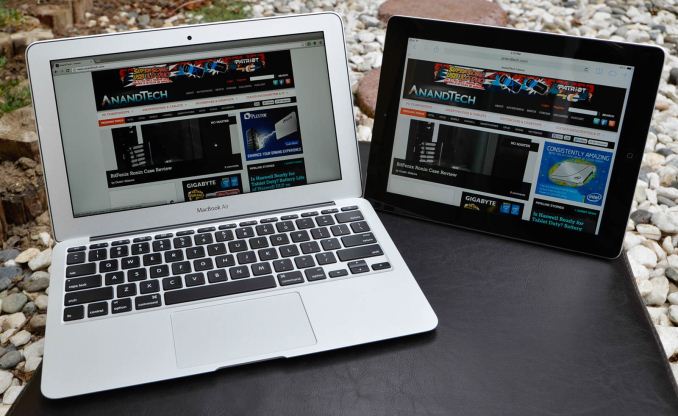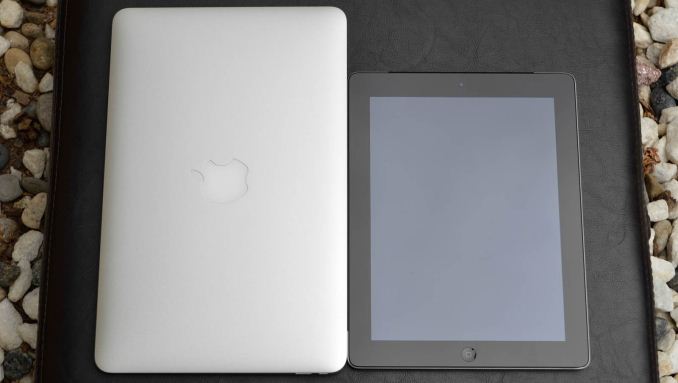The 2013 MacBook Air Review (11-inch)
by Vivek Gowri on August 9, 2013 1:45 AM ESTSince the last time the iPad versus MacBook Air 11” comparison was brought up, both products have improved and evolved tremendously, the iPad more so than the Air. It’s easy to dismiss even making the connection (because who here actually cross-shops a high-end ARM tablet with a mid-range ultraportable, raise of hands please) but I think there are enough shared attributes to make a discussion worthwhile, especially considering the similarity in terms of form factor and now battery life. If I was looking for an extremely compact, thin, light, and long-lasting companion device to bring on a trip, they’re both completely valid answers. But which would I actually take?
The short answer would almost always be the Air, for a variety of reasons, but I’ll get there. This basically goes back to the tablet versus notebook conversation for various usecases. The iPad is awesome as a travel device, as are most tablets in general, and you can see evidence of this in any airport terminal. Especially after the screen upgrade last year, the iPad is hands down one of the best content consumption devices on the market. It’s also my absolute favorite digital platform for reading. I’ll actually save lengthy articles, like some AnandTech reviews and other long-form content from other websites I enjoy, to read on my iPad. Between the sharpness of text on the Retina display and the physical closeness you have with the words, it’s about the closest you can get to a paper reading experience on an LCD. (This also holds true for any high-DPI tablet, including the Nexus 7.2, Nexus 10, Surface Pro, and others). Also, the ability to use a tablet with only one hand, not needing a platform of some kind, and general versatility of physical handling adds a convenience factor that’s hard to get from a notebook.
But when the tablet doesn’t have an inherent advantage in terms of size or battery life, it’s a lot harder to justify skipping the sheer versatility and power you get out of a real notebook computer, even a small one, for reasons that amount to the tablet being easier to use while standing up. The notebook is basically better at everything other than reading, and there’s far more computing horsepower at your disposal. You have far more control over everything that happens—media, browsing, documents, you name it. And there’s a real, physical keyboard, so in terms of productivity, there’s just not a conversation. To some degree, that’s always been something that held tablets back for me and I suspect the other editors on staff. Admittedly, our usecases typically involve a lot of writing and email, neither of which is easy at all without a hardware keyboard, so we’re probably not the right target demographic to judge tablets by.
The capabilities of a Core i5-based ultraportable are so far beyond that of an iPad or Nexus 10 though, which is part of what makes this on the surface a somewhat odd comparison to be making. Obviously the tablets are cheaper, though it’s worth pointing out that a 128GB iPad (WiFi) is only $200 less than a 128GB Air 11”, and as noted earlier the iPad keyboards typically run $100. I don’t know why anyone would need that much storage on an iPad, maybe if you had a ton of 1080p video content that you really needed to carry with you everywhere. The 16 and 32GB iPads, at $499 and 599, are obviously far more accessible and probably more sensible investments.
I’m not trying to recommend that people buy the Air over the iPad, just that it’s possible to do so with very little compromise. It wasn’t really something you could do until now simply because of battery life, but with Haswell ULT boasting similar or better power efficiency than high-end ARM SoCs in light everyday CPU-driven workloads, it’s certainly something to think about. I think the best of both worlds situation is yet to come, possibly with something that looks like a thinner, Haswell-based Surface Pro with Windows 8.1 and significantly better battery life than we’ve seen out of Ivy Bridge tablets in the last year.












139 Comments
View All Comments
ccd2 - Monday, August 12, 2013 - link
It could be that Apple makes for good one stop shopping. Many like myself have issues with the cost of Apple machines, but hardly anyone questions their quality. Many feel that, in part, Microsoft and Google entry into hardware is due to the failure of non apple OEM to offer well executed productsKPOM - Saturday, August 10, 2013 - link
If you travel a lot the 11" Air is a good choice. Try using a 15" or even some 13" notebook in the middle seat on an airplane tray table and you'll see why. The 11" and 13" MacBook Air models have identical internals now.beggerking@yahoo.com - Sunday, August 11, 2013 - link
absolutely no need to be torn between an ipad vs air... just get a Surface PRO!! even the current version beats air with its touchscreen and pen input..the next version with Haswell processor will absolutely replace both ipad and air.
name99 - Sunday, August 11, 2013 - link
For christ's sake. You are committing an even dumber error than Vivek with his repeated reference to "real computer.The salient difference between an iPad and an MBA is not the realness of the computer, it is that they have different input systems, and these different input systems have different strengths.
It would be a simplification, but a justifiable one, to say that the MBA, with its keyboard and trackpad, has a much higher bandwidth input system. That's not quite true --- for certain purposes (making music for example) multi-touch provides a high bandwidth input system. But for MOST purposes, the keyboard provides rapid input of one sort, the trackpad rapid input of another sort. Typing on glass does not match the keyboard speed, and even the with keyboard of a Surface Pro you're missing the fine accuracy and immediacy of a trackpad.
The point is not that one is "better" than the other. That's precisely the sort of stupidity that leads you to create devices like Surface Pro which try to do too many things and do them all badly.
The point is that different is DIFFERENT. Navigating Apple Maps is vastly superior on my iPad to navigating Google Earth on a laptop or my iMac, and while I imagine Apple will do a good job with their UI for Maps on OSX 10.9, my guess is it will not be as good as on the iPad. The task of manipulating the 3D view of a city works really well with the immediacy afforded by a multitouch screen. Music is a similar sort of activity where that sort of immediacy can work well, likewise for some types of art creation.
We're on our first tentative steps to voice UIs, but there are already a few situations where commanding Siri is indeed faster than the alternative ways of getting things done.
MBAs and iPads will coexist for a long time because they do different things, and the way they do those different things is so intrinsic to the way they are shaped that each cannot usefully be morphed into the other. When Vivek says he wants a "real" computer he means that, for certain tasks, he wants the high input bandwidth that an MBA gives him. He's not going to be satisfied by replacing that with a keyboard that's not as good, no trackpad, and apps that are not optimized for this sort of high bandwidth input. And why should he have to? It's easy enough and cheap enough (and getting cheaper every year) to have both.
beggerking@yahoo.com - Sunday, August 11, 2013 - link
a single Surface Pro replaces both. better and cost less.KPOM - Sunday, August 11, 2013 - link
Not really. It's too big and bulky to be used as a tablet, and its screen is even smaller than a MacBook Air. Plus it has only a single USB port. A MacBook Air has two USB ports and a Thunderbolt port.Tablets seem to be settling into the 7-8" range. Where that leaves the 11.6" MacBook Air is a bit uncertain, since a 13" MacBook Air or Ultrabook provides more viewing area. Perhaps the next version will fit in a 12.5" screen. Even as is, however, an 11.6" MacBook Air does provide a better desktop computer experience.
TheinsanegamerN - Sunday, August 11, 2013 - link
surface pro has 2 usb ports. please go and LOOK at one before denouncing it.KPOM - Sunday, August 11, 2013 - link
Not according to this:http://www.microsoft.com/surface/en-us/surface-wit...
Ports Full-size USB 3.0
microSDXC card slot
Headset jack
Mini DisplayPort
Cover port
Site7000 - Sunday, August 11, 2013 - link
Then why doesn't anybody buy them?willstay - Monday, August 12, 2013 - link
I would like to know battery performance with Parallels or VMFusion running Microsoft Outlook connected to Exchange Server in Windows 8 Vs running Windows 8 as base OS.